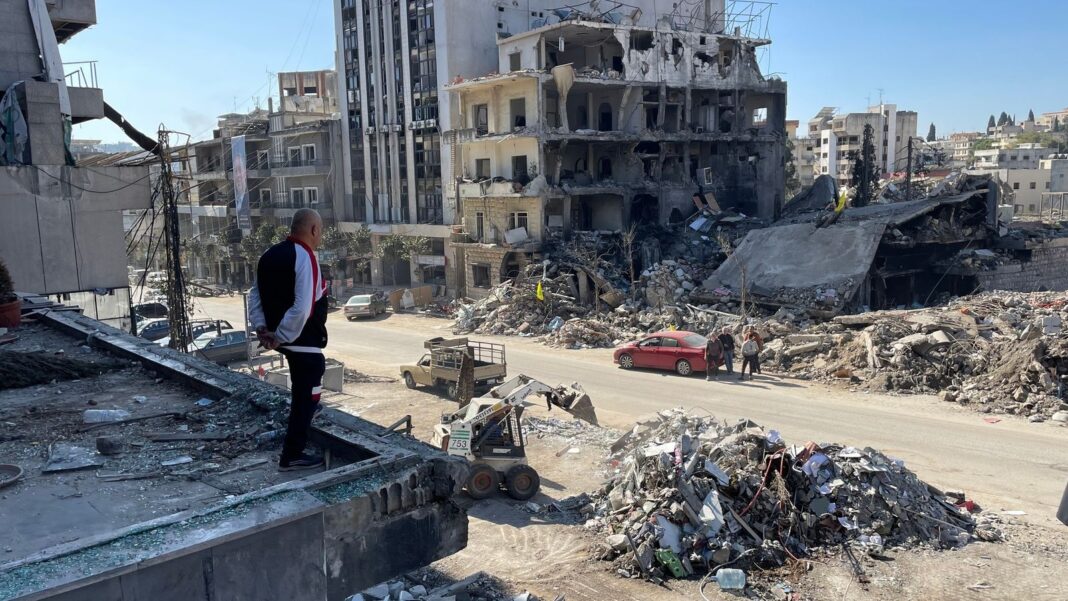In Nabatieh, in the south of Lebanon, stoicism can border on nonchalance.
Next to a deep crater – all that is left of a four-storey building – an elderly man wearing aviator sunglasses sits relaxed on a chair, as a large digger deafeningly excavates the rubble beside him.
Across the road, a tower has been reduced to a concrete shell by the same explosion.
On one of the floors, a man is sitting down smoking shisha, while he blasts songs from the Lebanese Revolution out of his speakers. He waves at us from a distance.
His name is Jalal Nasser and he’s the owner of a cafe. He returned to Nabatieth on the first day of the ceasefire.
“I came on the first day, 5am, and I put the first shisha in South Lebanon! I put it in the first day.
“Because I want to put some hope in people. We can’t sit at home crying. We must have some hope.”
Jalal Nasser returned to his cafe in Nabatieth on the first day of the ceasefire
We speak looking out over the bomb site. He is affable in the extreme and it is hard to keep his attention: he keeps waving at the cars which beep to say hello.
He is optimistic about the ceasefire, which appears ever more fragile.
“I think it will hold. You know, always like this. It stops, it takes one month, some months… I know I’m 50 years old, I know from 1982, when Israel came here, I was 8 years old!”
Others are less sure. The night before we arrived, Israel conducted airstrikes as little as eight miles away.
“We heard missile strikes, airplanes – we thought that the war was still going on,” Ali Hariri says, sitting outside a coffee truck.

Ali Hariri tells Sky News ‘I don’t know that [the war] really will be stopped’
Hariri is a lawyer by trade but for the last few months has been volunteering for a local aid organisation.
“I think it was a weak ceasefire,” he says. “We wish the war had stopped many years ago but I don’t know that it really will be stopped.”
He has good reason to think that – it is the official line of the Israeli government.
On Tuesday, Prime Minister Benjamin Netanyahu said: “We are currently in a ceasefire, I note, a ceasefire, not the end of the war.”
And Israel’s defence minister warned: “If we return to war we will act strongly, we will go deeper, and the most important thing they need to know: that there will no longer be an exemption for the state of Lebanon.
“If until now we separated the state of Lebanon from Hezbollah… it will no longer be [like this].”
Read more:
Hezbollah flags still fly in Lebanon
Ceasefire ‘victory’ looks bleak
Hezbollah media said that commanders were being reminded again and again by central command not to engage in any activity that could threaten the ceasefire.
But even if the group has been badly mauled, its defiance and its ideology remain unbowed.
In the hills of Nabatieh, we drive to a neighbourhood where almost every residence has been destroyed.

We meet one family picking through their ruined house: their father was a Hezbollah leader killed in an airstrike.
We are invited to a flat down the road, to speak to a woman there called Em Ali Awada.
Her son was a Hezbollah militant, he was killed 10 days ago. Her other son died in the 2006 Israel-Lebanon war.
Her flat is full of neighbours and well-wishers and the air is heavy with cigarette smoke.

Em Ali Awada has lost two sons to fighting with Israel
Wearing a black veil and still visibly stricken with grief, she remembers her sons.
“When our children are martyred we know where they are going, our children are heroes,” she says.
“But you definitely feel sorrow for their absence and you cry for it, because I gave birth and raised and spoiled my children.
“I want all the world to know that we are not terrorists, we are the owners of this land. We fight with belief and loyalty.”
That fight is paused. It may very well not be over.







